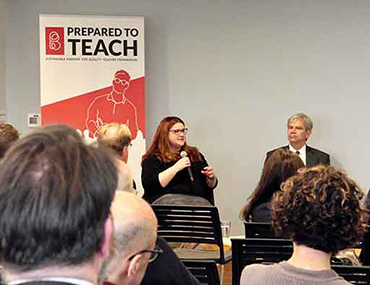This spring, the Sustainable Funding Project, an initiative dedicated to finding pathways to support and sustain high-quality teacher preparation, changed its name to PREPARED TO TEACH: Sustainable Funding for Quality Teacher Preparation and released a new report titled “Following the Money: Exploring Residency Funding through the Lens of Economics.”
“The name PREPARED TO TEACH captures the core work we do with all of our partners: making sure that every teacher is ready to take on the challenges of the classroom, every school has excellent educators, and every student has the opportunity to learn,” said Karen DeMoss, Director of PREPARED TO TEACH at Bank Street College. “We know that funded teacher residencies can transform education for the 21st century and we look forward to continuing to provide tools and information to other thought leaders committed to ensuring every aspiring teacher has equitable access to quality teacher.”
 To help increase awareness of the new report, PREPARED TO TEACH welcomed educators and thought leaders to a panel discussion on April 8 titled “Following the Money, Making a Change.” Designed to share an in-depth look at the economics of teacher preparation and the systemic shortcomings of current teacher preparation models, the “Following the Money” report explores how, with a modest investment, the teacher labor market could dramatically shift to allow more strong individuals to enter the profession and, in turn, create better schools.
To help increase awareness of the new report, PREPARED TO TEACH welcomed educators and thought leaders to a panel discussion on April 8 titled “Following the Money, Making a Change.” Designed to share an in-depth look at the economics of teacher preparation and the systemic shortcomings of current teacher preparation models, the “Following the Money” report explores how, with a modest investment, the teacher labor market could dramatically shift to allow more strong individuals to enter the profession and, in turn, create better schools.
In her opening remarks, DeMoss highlighted how economics—specifically the high costs associated with quality teacher preparation—preclude people from entering the teaching profession and advocated for a significant shift in the country’s approach to high-quality teacher preparation and equitable access to the profession.
“We are trying to figure out how we can pay our candidates to have strong clinical experiences with the wonderful educators that are currently out there in our schools. If the nation thought it were really important to have well-prepared candidates, it would only cost somewhere between $2 and $10 billion per year to certify every single person through a funded graduates program,” she said. “We easily pay twice that much for NASA or farm subsidies. We don’t have the value system right now that is saying we should do this work as a country. But we could. We could build that value system.”
Funded residencies, she said, can transform education systems through equitable access to the experiential models of preparation common to other professions, such as medicine. Research gathered by PREPARED TO TEACH shows that a shift toward funded teacher residencies would create well-prepared teachers who stay in the profession longer and strengthen schools over time.
After sharing key findings from the report and exploring the strengths and challenges of existing funding models, DeMoss facilitated a panel discussion with John D’Agati, Deputy Commissioner, New York State Education Department, Office of Higher Education, and Amanda Lester, Director, Programs & Professional Learning, American Association of Colleges for Teacher Education (AACTE). The discussion focused on the intersecting challenges inherent in current teacher preparation models and the need for community engagement to move the needle both within New York State and nationwide.

“The types of programs that students have access to is a huge factor in their ability to thrive,” said Lester. “The whole idea of building out communities and really thinking out how you can share knowledge amongst different residency programs [is key] so we can start to think through what types of resources really make sense at the local level.”
D’Agati agreed. “We have never looked at [residencies] in the same way other professions did. But I think people have come to realize that the outcomes for students are directly related to the qualified teacher.”
After the panel discussion, audience members engaged in a lively question and answer session with the panelists. Many agreed that more conversation is needed to help create meaningful change in how teacher residencies are funded. “This conversation—from the state level, with higher ed, and with superintendents across the state—is absolutely necessary to move this in a reasonable amount of time. Many of us are champing at the bit to make this work,” said one guest.
A shift toward funded residencies would establish a P-20 education system with aligned labor markets and systemic educational improvements for all students, DeMoss noted. Teacher candidates from all backgrounds—including teachers of color—would have the financial and practical support needed to enter the profession and transform students’ lives.
“The economics of teacher preparation has really big implications. If a child of color, for example, has one teacher of color in elementary school, she is more likely to graduate high school, saving about a quarter of a million dollars in taxes and social services over the life of a child who would otherwise not have graduated high school…. It is in our power to change the system, but we’ve got to work together to make that happen” said DeMoss. “We are claiming for our profession what we want our profession to be. PREPARED TO TEACH is not a program, it’s a movement.”
Click here to read the “Following the Money” report and here to learn more about PREPARED TO TEACH.